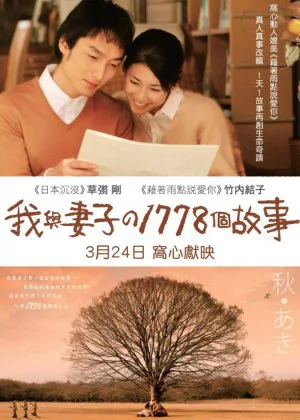1778 Stories of Me and My Wife
Do not be fooled by the rather generic poster art, 1778 Stories of Me and My Wife [Boku To Tsuma No 1778 No Monogatari] isn't your typical or average Japanese drama. While you might be forgiven thinking that this is just another introverted, soft and light-hearted Japanese film, Mamoru Hoshi hides a more magical world underneath its wings. The result is a sprawling little film that overflows with charm and steers clear from any sentimental pitfalls.
![screen capture of 1778 Stories Of Me And My Wife [Boku To Tsuma No 1778 No Monogatari]](/thumbs/img/articles/1200xauto/1778-stories-1.webp)
Even though the marketing of the film makes it look a little inconspicuous, Hoshi doesn't waste too much time once the film starts. The first scene dives right into the action, baring Hoshi's intentions and suddenly making the outlook of a 140-minute drama a lot less daunting. From the very first seconds Hoshi managed to capture my attention, never letting go for even the slightest of moments until the last frames had faded from the screen.
1778 Stories (based on a true story, hence the rather specific number) follows the life of Sakutaro, a dedicated writer of science-fiction novels. Sakutaro is a pretty geeky guy, having decorated his entire house with old robots and other classic sci-fi memorabilia. From the front porch to key hangers and paper weights, everything inside Sakutaro's house breathes sci-fi. Even though Sakutaro's novels aren't too popular, he lives a pretty happy life with his supportive wife (and biggest fan), Setsuko.
When one day Setsuko visits the hospital thinking she is pregnant, the lives of Setsuko and Sakutaro take a turn for the worse. Not long after her first visit Setsuko is diagnosed with an advanced form of colon cancer, shattering the dreams of the couple. Sakutaro feels totally helpless, until the doctor tells him that laughter helps to strengthen the immune system. Sakutaro does what he knows best and starts writing a daily short story for his wife to enjoy. Instead of writing sci-fi though, he takes a crack at writing comedy.
![screen capture of 1778 Stories Of Me And My Wife [Boku To Tsuma No 1778 No Monogatari]](/thumbs/img/articles/1200xauto/1778-stories-2.webp)
Hoshi's visual style can best be described as dreamy. Even though the short intermissions (acting almost as short films) are the visuals stand-out moments of the film, the regular scenes are equally beautiful. A meandering camera, elaborately detailed settings, soft, warm and vibrant colors and some smart focus tricks make for a very cozy and fuzzy visual look that is not quite unlike the work of Jean-Pierre Jeunet (only a little lighter in atmosphere). The CG is mostly functional, though its imperfections do match (and strengthen) the charm of old sci-fi films.
The soundtrack, while pretty classical in setup, is one of the best I've heard in the genre. Sure enough you'll find plenty of piano tunes here, ranging from dramatic to upbeat pieces, but Hoshi's timing is simply impeccable. The score never becomes too sentimental or mushy, instead it strengthens the atmosphere of certain scenes, making the drama all that more effective.
Tsuyoshi Kusanagi isn't one of my favorite actors, but he fits the role perfectly. His voice-overs are warm and considerate while he emits a geeky vibe that doesn't immediately turn him into too much of a sap. Yuko Takeuchi does a solid job playing Setsuko; providing just enough support and care for Kusanagi to thrive. Ren Osugi is probably the most recognizable face of the film though, I bet he's the actor with the most supporting roles in modern Japanese cinema to date, always a pleasure to behold too.
![screen capture of 1778 Stories Of Me And My Wife [Boku To Tsuma No 1778 No Monogatari]](/thumbs/img/articles/1200xauto/1778-stories-3.webp)
1778 Stories is quite dramatic at its core, but the film presents itself in such a warm, upbeat and uplifting manner that you'll hardly notice any of that when watching this film. Even the finale, while far from a happy ending, is handled with the right amount of emotion, never overstating the gravity of the events. Even though you could say this is quite typical for Japanese dramas in general, 1778 Stories has a particularly gallant way of dealing with its potentially sentimental twists.
Hoshi creates a wonderfully magical drama, serving just the right amount of drama, geekiness, magical realism and love for his characters. The film looks and sounds amazing, the characters are extremely lovably and while 140 minutes is quite a demanding length for an upbeat film like this, I can't remember checking the clock once. Hoshi's films may be few and far between (3 films in 12 years time isn't that much), but he immediately joined my list of directors to keep track of. 1778 Stories is recommended material for everyone with an interest in Japanese cinema.
